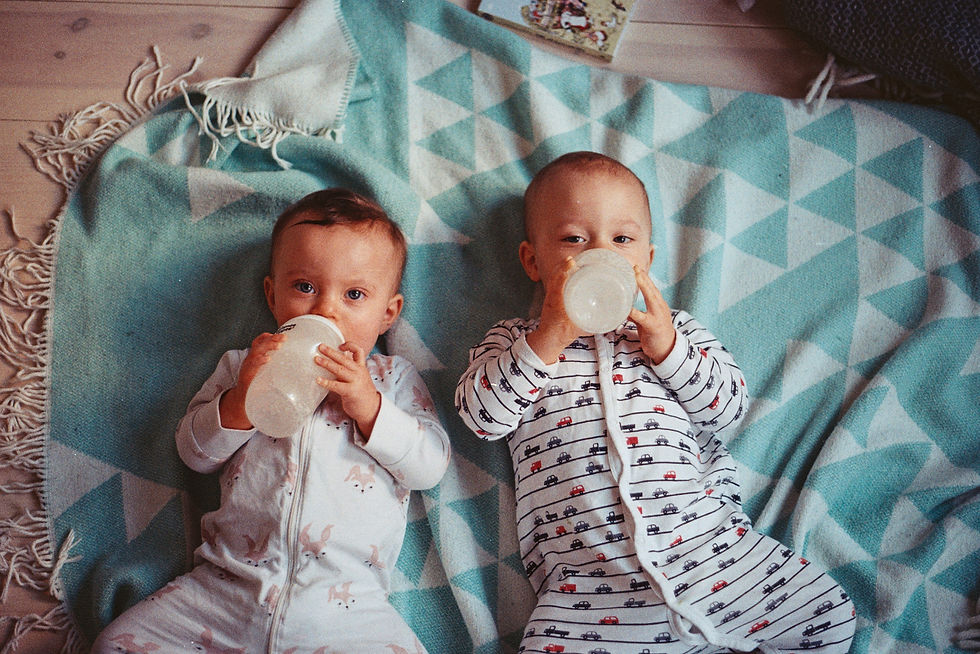Feeding your baby: is breast really best?
- simone620
- Feb 13, 2023
- 4 min read
There’s a common taboo with feeding your baby, especially when it comes to feeding your baby formula – but is breast really best? Does it make you a bad mother if you don’t want to breastfeed? We spoke to a midwife to get her opinion on the subject – she had five children, all of which she fed formula, but the attitude to breastfeeding and bottle feeding at the time was different.

Q: What are your personal experiences of breastfeeding?
A: When I was growing up, I had no role models for breastfeeding.
I had my first baby at 21. I was very shy and didn’t know how to obtain the knowledge that I needed to be able to breastfeed my baby. I knew that I wanted to. I didn’t live near any of my family members when I had my first baby. When I had Alice, I hadn’t even held a baby. I was completely clueless.
Q: What was childbirth like for you?
A: I had a relatively normal delivery. I was in labour for 13 hours and narrowly escaped a blood transfusion. I spent the next three months with very low iron levels, making me very tired. I lost a lot of blood too. This all meant that I had difficulty producing milk.
I’m a midwife now, so I know that some women have it a lot worse with 20-hour labours, caesareans, and forceps, to name a few. I spent just one night in the hospital.
Q: What support did you receive with breastfeeding?
A: My baby cried, and I attempted to breastfeed her but handling her was difficult. A midwife did come to my aid a couple of times, maybe she knew that my baby wasn’t feeding. She didn’t say much to me. Her assistance was simply grabbing my breast in one hand and the baby in the other and connecting the two. She fed for two minutes. This was my breastfeeding support. Nobody took the time to explain what needed to be done, where her mouth needed to be or the anatomy of the breast. I wasn’t taught how to hand express for when she couldn’t latch on or the different positions of feeding.
Alice wanted to feed all the time – I was alone and unhappy. I didn’t have any females around who could support me. I know now that she was only feeding from the nipple – this means that she wasn’t accessing the milk that comes from long deep sucking. This milk is fat building milk. As a result of this, my baby lost a lot of weight.

It was very upsetting for me. I’ve carried this guilt throughout my life. My baby was trying to feed and feed and feed to get calories in. A health visitor came every day to see me. By day 10 she had lost a lot of weight and she needed to go to the neonatal unit.
I was told she had to be bottle-fed. She was bottle-fed for the days that she was in the neonatal unit and gained weight. After a couple of days, she was released. I was finally able to recover and get the rest that I needed. I was happy to have a healthy baby.
Q: As a midwife, how do you use your personal experiences to help women today?
I would never tell someone they have to bottle feed, or that they can’t breastfeed their child. If you want to breastfeed, even if you struggle to do so, or need to get the hang of it, then you will get support. The staff will help you by showing you what needs to be done, they’ll go through it with you.
When it comes down to it, as long as the baby is fed every three hours and the breasts have not dried up, the mum can always hand express, pump or breastfeed to get the milk up.
Mothers tend to feel like failures when their bodies won’t work. In other cases, they’ll feel like a failure for needing to have an epidural or a caesarean. As mothers, we have such high expectations of ourselves.
Q: Is breast really best?
A: I don’t think terms like ‘breast is best’ help the matter. It just makes mothers feel guilty for not giving the ‘best’ to their children

I’ve carried the guilt and feeling of failure all of this time, and I know other mothers will have too. In reality, breast isn’t necessarily best, especially if you don’t want to breastfeed. There’s a lot of nutrients in formula.
In some cases, a woman doesn’t want to breastfeed. Sometimes, they find it repulsive. I am completely okay with that. Your midwife is not going to pass judgement on how you want to feed your baby. I want women to know that it doesn’t make you a bad mother. As long as your baby is fed, it’s fine. You’re not a bad mother if you don’t want to breastfeed. We as midwives are happy if the mother knows what they know what they want and if that is too not breastfeed That’s fine. Likewise, if you do want to breastfeed and want some support then that’s fine too.





Comments